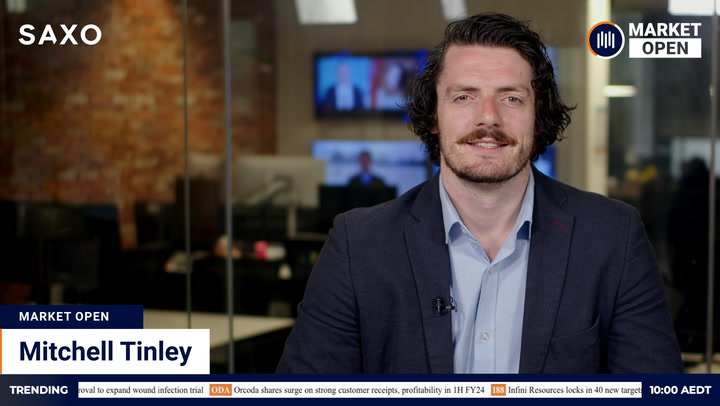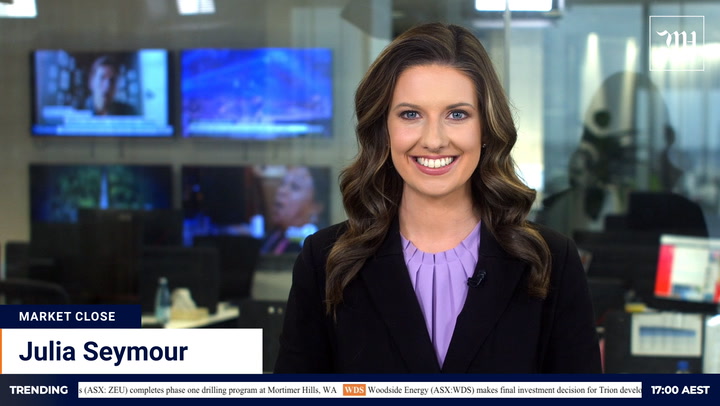Shares retreated from a two-month high as the RBA acknowledged rising inflationary pressures but talked down the threat of rate increases next year.
The S&P/ASX 200 fell for the first time in three sessions. The Australian benchmark sank 50 points or 0.67 per cent following weak leads from Wall Street.
Ten of eleven sectors declined. Mining stocks led the sell-off after setbacks for iron ore and copper. Transurban, Afterpay and Goodman Group bucked the downtrend.
What moved the market
Anxious home-owners fretting about mortgage rates have an ally in RBA Governor Philip Lowe, who once again dismissed the likelihood official rates will rise next year. Mr Lowe used a speech about inflation to an audience of economists to challenge financial markets pricing in increases.
“The latest data and forecasts do not warrant an increase in the cash rate in 2022,” he said. “The economy and inflation would have to turn out very differently from our central scenario for the Board to consider an increase in interest rates next year. It is likely to take time to meet the condition we have set for an increase in the cash rate and the Board is prepared to be patient.”
Mr Lowe said Australia had experienced a lift in inflation, but it was less pronounced than in countries such as the US. Energy prices had trended lower in recent years and pressures on wages were subdued.
“We expect underlying inflation to pick up further, but to do so only gradually. On the one hand, some normalisation in consumption patterns here and around the world should partly alleviate the current upward pressure on inflation. But on the other hand, we are expecting a gradual pick-up in wages growth as the labour market tightens,” he said.
Bond and currency markets were largely unmoved. The yield on ten-year Australian government bonds held onto a rise of six basis points. The dollar edged up 0.1 per cent to 73.5 US cents.
Also weighing on sentiment was the heaviest decline in consumer confidence in 14 weeks. The ANZ-Roy Morgan confidence index fell 2.8 per cent last week to 106 as Australians fretted over the cost of living and a jump in unemployment. The survey’s measure of inflation expectations hit a six-and-a-half-year high.
“Record petrol prices, higher food prices, elevated utilities bills and annual insurance price hikes are worrying households ahead of the Christmas shopping period,” CommSec’s senior economist Ryan Felsman said.
The local market was an outlier during a generally positive session on regional markets. The Asia Dow built to a gain of 0.36 per cent, China’s Shanghai Composite 0.29 per cent and Hong Kong’s Hang Seng 1.05 per cent. Japan’s Nikkei was steady.
Overnight, the S&P 500 finished dead flat as a jump in treasury yields weighed on Big Tech. The Dow and Nasdaq Composite dipped less than 0.1 per cent.
Winners’ circle
I.T. was the only sector to resist the sinking tide. NextDC gained 1.81 per cent, Afterpay 1.72 per cent and Technology One 1.39 per cent.
Property and utilities were ahead in the morning, but eased by the close. APA Group gained 0.9 per cent, SCA Property 0.36 per cent, Charter Hall Retail 0.24 per cent and Origin Energy 0.2 per cent.
Mirvac ended flat after CEO Susan Lloyd-Hurwitz told today’s AGM the developer was entering the “biggest delivery phase” in its history. The company has $28 billion in projects underway.
Ms Lloyd-Hurwitz said the work “in the long term will contribute to high-quality recurring income, while providing capital partnering opportunities and further development upside”.
Lifestyle Communities gained 0.19 per cent after CEO James Kelly told today’s AGM sales rates held up well despite lockdowns closing offices and preventing onsite inspections. The company achieved 141 sales to the end of October, with another 245 homes sold, but not settled.
The session’s best performers aside from tech were Chalice Mining +3.71 per cent, Virgin Money UK +2.61 per cent and Polynovo +1.65 per cent.
Of the heavyweights, Transurban put on 1.03 per cent and Goodman Group 0.17 per cent.
Doghouse
Telstra eased 1.25 per cent as investors heard more about the telco’s plans to expand its footprint into digital health and energy. By FY25 the company aims to generate $500 million in annual revenue through Telstra Health and be a top five energy retailer, today’s Investor Day was told.
OZ Minerals raised its total copper ore reserves by 5 per cent after updating the resources at its Prominent Hill and West Musgrave mines . The share price fell 0.74 per cent.
BHP and Rio Tinto retreated following drops in iron ore and copper prices in the wake of the Chinese property market’s first setback in six and a half years. BHP dropped 2.59 per cent and Rio Tinto 2.23 per cent.
Other prominent declines included Wesfarmers -0.61 per cent, CSL -0.77 per cent and Woolworths -0.43 per cent.
Aerial mapping group Nearmap slid 3.87 per cent to a fifth straight loss since releasing disappointing growth targets.
AusNet dipped 1.92 per cent as its shares traded ex-dividend.
Other markets
S&P 500 futures gave up early gains to sit unchanged at the ASX market close.
Oil regained momentum after a mixed night session. Brent crude climbed 68 US cents or 0.83 per cent to US$82.73 a barrel.
Gold rose US$1.30 or less than 0.1 per cent to US$1,867.90 an ounce.





